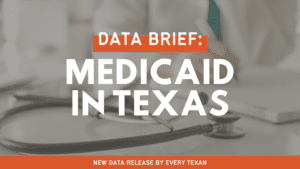In Texas and across the U.S., people enrolled in a health insurance program — private or public — have better access to health care than the uninsured: studies show that the uninsured are less likely to get prevention services, or care they need for their major health conditions and chronic diseases.
Texas’ high uninsured population and percentage have been persistent over several decades, and despite increased coverage for adults from the Affordable Care Act (ACA) and real gains for children, Texas lags far behind the other 49 states.
One reason Texans have not demanded solutions may be this: most Texans don’t know the uninsured rate in Texas is higher than other states — let alone that we have been ranked worst for many years! That same 2019 poll also found 35% of Texans did not know if Texas had expanded Medicaid under the ACA (and 18% incorrectly believe that Texas had expanded the program).
Texas is one of just 14 states that have not accepted federal funds — estimated at $10 billion a year for Texas — from the Affordable Care Act (ACA) to cover these adults.
Solutions are needed for Texans of all income levels, but the single largest step forward Texas could make would be to provide Medicaid coverage to 1.5 million currently uninsured adults. More than half of these uninsured Texans have incomes below poverty, and are excluded from ACA insurance subsidies by a legal loophole. To address the other 3.5 million uninsured, Texas government must pass laws to reduce the premiums and deductibles for consumers, and Congress must close ACA loopholes that shut low-income families out of subsidies, and reduce premiums and deductibles for moderate-income families who can’t get subsidies today.







